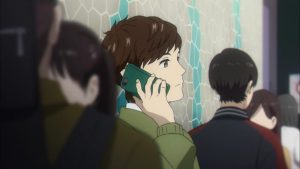 The first series post of January is always a bit of a shock to the system. The end-of-year hiatus is basically a week off from episodic blogging, and the only one of comparable length – it’s a strange feeling getting back into it after the chain of year-end posts. And by the luck of the calendar there’s no easing into things in 2019 – we start on the weekend and winter hits the ground running, with both new and returning shows a part of the mix. Let the madness begin anew.
The first series post of January is always a bit of a shock to the system. The end-of-year hiatus is basically a week off from episodic blogging, and the only one of comparable length – it’s a strange feeling getting back into it after the chain of year-end posts. And by the luck of the calendar there’s no easing into things in 2019 – we start on the weekend and winter hits the ground running, with both new and returning shows a part of the mix. Let the madness begin anew.
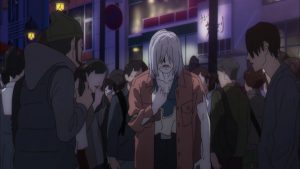 It begins with Boogiepop wa Warawanai, a series that was solidly in the mid-tier of my expectations for Winter 2019. It’s an adaptation of a series of light novels back from when that term meant something very different than it does now, and in fact the first adaptation aired way back in 2000. While it’s a show that seems to have a considerable cult following, I’ve somehow managed to whiff on it completely over the years – I know of it of course, both in reputation and premise, but never got around to checking it out. So I go into this incarnation more or less cold turkey – which made the first two episodes a somewhat opaque proposition.
It begins with Boogiepop wa Warawanai, a series that was solidly in the mid-tier of my expectations for Winter 2019. It’s an adaptation of a series of light novels back from when that term meant something very different than it does now, and in fact the first adaptation aired way back in 2000. While it’s a show that seems to have a considerable cult following, I’ve somehow managed to whiff on it completely over the years – I know of it of course, both in reputation and premise, but never got around to checking it out. So I go into this incarnation more or less cold turkey – which made the first two episodes a somewhat opaque proposition.
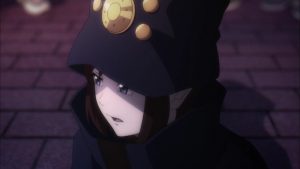 This version, like the first, comes to us from Madhouse. And it’s directed by Natsume Shingo, who certainly qualifies as that studio’s top director these days and has a deserved reputation as a project manager who can recruit elite talent to the series’ he commands. And he’s done so here, assembling what I would call a rock-solid core of Madhouse veterans with a healthy dollop of Sunrise in the mix as well. The first two episodes (as is increasingly less rare these days, Boogiepop gets a double-episode premiere) have a very old-school Madhouse look to them, both in terms of character design and animation, intercut with a few really eye-catching Natsume shot compositions.
This version, like the first, comes to us from Madhouse. And it’s directed by Natsume Shingo, who certainly qualifies as that studio’s top director these days and has a deserved reputation as a project manager who can recruit elite talent to the series’ he commands. And he’s done so here, assembling what I would call a rock-solid core of Madhouse veterans with a healthy dollop of Sunrise in the mix as well. The first two episodes (as is increasingly less rare these days, Boogiepop gets a double-episode premiere) have a very old-school Madhouse look to them, both in terms of character design and animation, intercut with a few really eye-catching Natsume shot compositions.
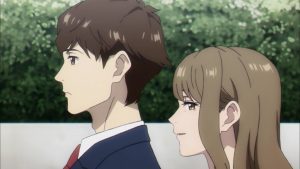 As I understand it “Warawanai” adapts different novels than the first anime did, though set in the same mythology. There isn’t a whole lot of preamble here, but I sense that this is less an assumption that viewers will have seen a 20 year-old series and more a stylistic decision. Adding to the challenging nature of these two episodes is that there’s obviously a lot of time-skipping going on – things happen in the first episode that are clearly set later than things in the second, and I counted at least tree distinct timelines during these eps. That’s fine for the most part – one still gets a basic sense of what’s going on here – but it does require a bit of patience on the part of the new viewer.
As I understand it “Warawanai” adapts different novels than the first anime did, though set in the same mythology. There isn’t a whole lot of preamble here, but I sense that this is less an assumption that viewers will have seen a 20 year-old series and more a stylistic decision. Adding to the challenging nature of these two episodes is that there’s obviously a lot of time-skipping going on – things happen in the first episode that are clearly set later than things in the second, and I counted at least tree distinct timelines during these eps. That’s fine for the most part – one still gets a basic sense of what’s going on here – but it does require a bit of patience on the part of the new viewer.
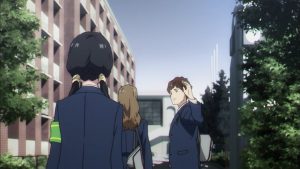 The setting here is a high school where girls have an annoying habit of disappearing without a trace, and the faculty is comically at a loss as to what to do about it. Several students pop in and out of the first two episodes in important roles, but it’s clear that Kirima Nagi (Oonishi Saori) is among the most important despite a relative paucity of screen time. She’s the daughter of a deceased author on murder and mental illness and the only one who really seems to be trying to get to the bottom of what’s happening at the school. Also clearly central is Miyashita Touka (Aoi Yuuki) who spends most of the first ep possessed by the mysterious Boogiepop, an androgynous (Aoi-san specializes in those characters) entity who says he/she pops up “like an eerie bubble” whenever there’s a danger to humanity. Which the “man-eater” at this school apparently is.
The setting here is a high school where girls have an annoying habit of disappearing without a trace, and the faculty is comically at a loss as to what to do about it. Several students pop in and out of the first two episodes in important roles, but it’s clear that Kirima Nagi (Oonishi Saori) is among the most important despite a relative paucity of screen time. She’s the daughter of a deceased author on murder and mental illness and the only one who really seems to be trying to get to the bottom of what’s happening at the school. Also clearly central is Miyashita Touka (Aoi Yuuki) who spends most of the first ep possessed by the mysterious Boogiepop, an androgynous (Aoi-san specializes in those characters) entity who says he/she pops up “like an eerie bubble” whenever there’s a danger to humanity. Which the “man-eater” at this school apparently is.
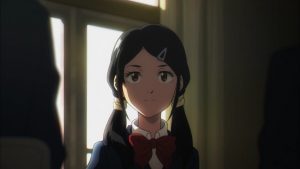 As we dig deeper, bits of tapestry are sewn into place. Apparently what’s happened here is that an alien named Echoes has come to Earth to check out whether humans are decent enough to be trusted, but he’s “evolved too much”, been captured and cloned by a government lab, and had his clone kill everyone at the lab and escape to become the “manticore” that’s terrorizing the school with the help of Saotome Masami (Enoki Junya). He seems to be doing so as a part of some kind of chuunibyou wish fulfilment. Also of note is a murder otaku, Suema Kazuko (Kondo Reina), who teams up with Kirima-san, and Takeda Keiji (Kobyashi Chiaki) a well-meaning third-year boy who’s sweet on Miyashita and befriends Boogiepop during his brief appearance in the first episode.
As we dig deeper, bits of tapestry are sewn into place. Apparently what’s happened here is that an alien named Echoes has come to Earth to check out whether humans are decent enough to be trusted, but he’s “evolved too much”, been captured and cloned by a government lab, and had his clone kill everyone at the lab and escape to become the “manticore” that’s terrorizing the school with the help of Saotome Masami (Enoki Junya). He seems to be doing so as a part of some kind of chuunibyou wish fulfilment. Also of note is a murder otaku, Suema Kazuko (Kondo Reina), who teams up with Kirima-san, and Takeda Keiji (Kobyashi Chiaki) a well-meaning third-year boy who’s sweet on Miyashita and befriends Boogiepop during his brief appearance in the first episode.
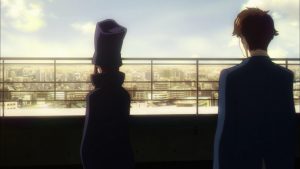 This is all interesting enough, and it seems there’s a good amount of allegory in this premise – for all its sci-fi trappings one senses that Boogiepop is really a story about man’s inhumanity to man. I wouldn’t say I found these two episodes to be deal-clinchers, but I’m genuinely interested in what’s happening here even if I don’t feel any particular closeness to the characters as of yet. Boogiepop wa Warawanai is tonally very much in the mold of turn-of-the-century anime science-fiction – there’s a cold detach to it which I’ll be interested to see if modern anime viewers respond to (I suspect they won’t, for the most part). And it’s obvious that this series is exceedingly professional and sophisticated in terms of direction and writing, which is going to prove a big plus to be certain. It’s hard to see this one not being interesting and involving at the very least – whether it manages to be more than that remains to be seen.
This is all interesting enough, and it seems there’s a good amount of allegory in this premise – for all its sci-fi trappings one senses that Boogiepop is really a story about man’s inhumanity to man. I wouldn’t say I found these two episodes to be deal-clinchers, but I’m genuinely interested in what’s happening here even if I don’t feel any particular closeness to the characters as of yet. Boogiepop wa Warawanai is tonally very much in the mold of turn-of-the-century anime science-fiction – there’s a cold detach to it which I’ll be interested to see if modern anime viewers respond to (I suspect they won’t, for the most part). And it’s obvious that this series is exceedingly professional and sophisticated in terms of direction and writing, which is going to prove a big plus to be certain. It’s hard to see this one not being interesting and involving at the very least – whether it manages to be more than that remains to be seen.


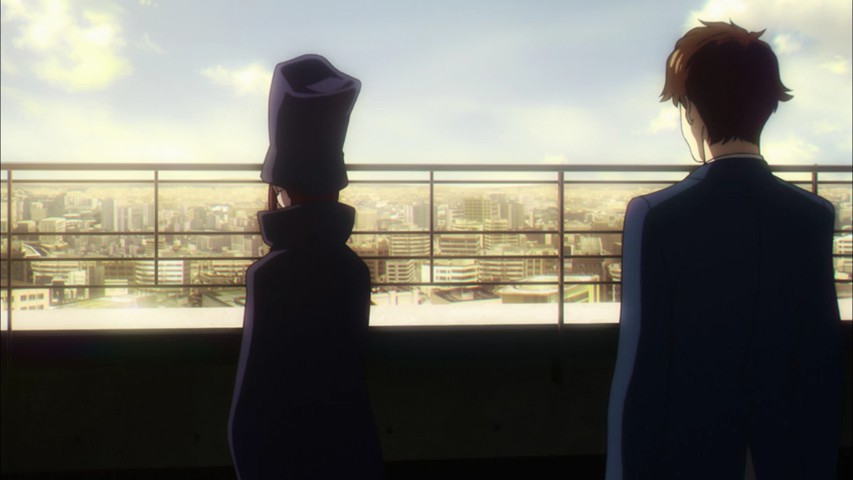
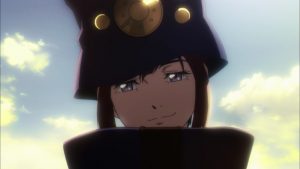
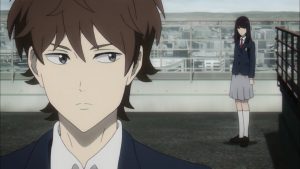
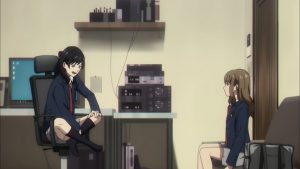
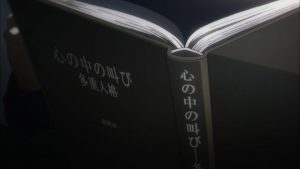
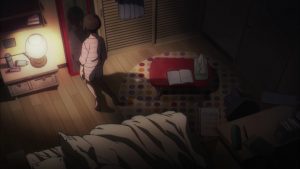
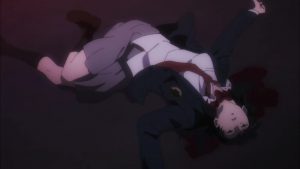

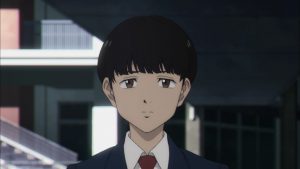
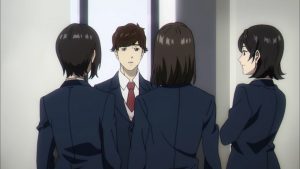
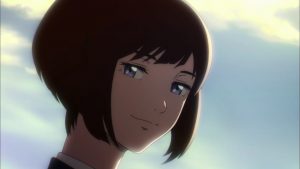
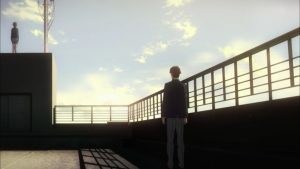
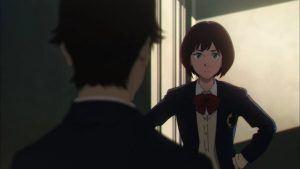
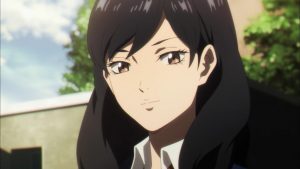
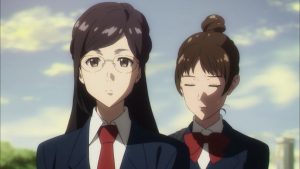
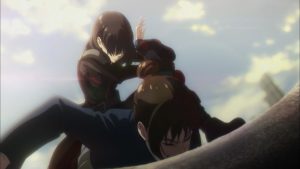
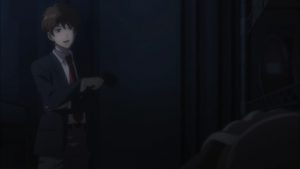
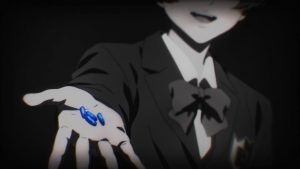
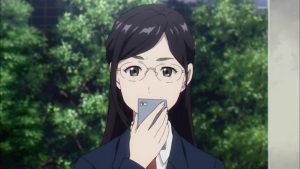
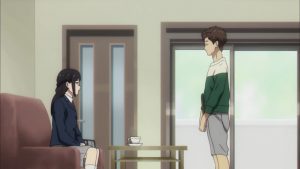

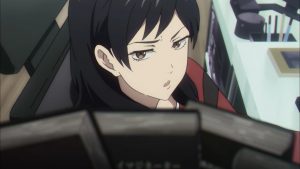
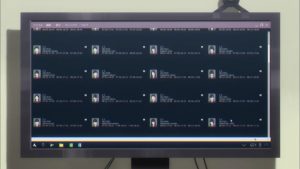

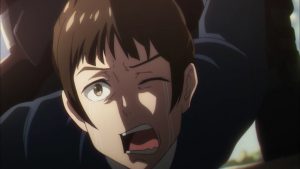
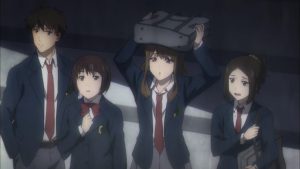
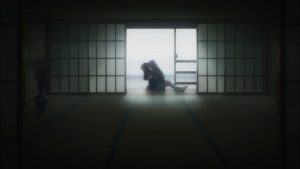
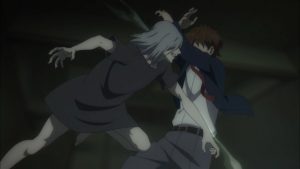
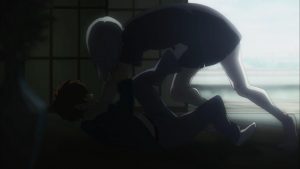
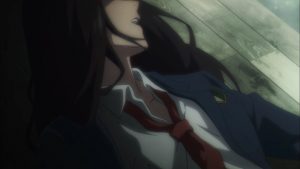
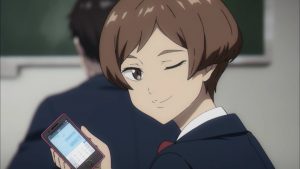
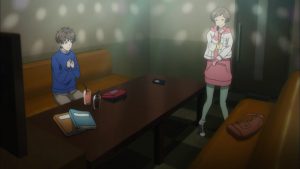
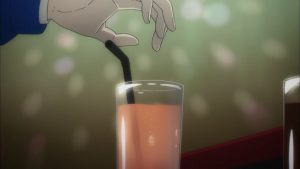
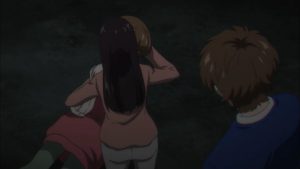
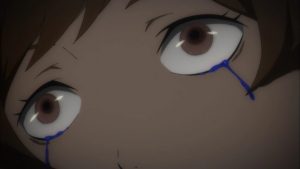
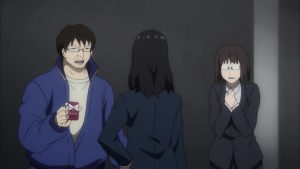
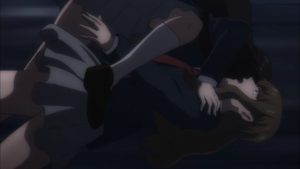
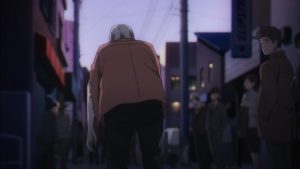

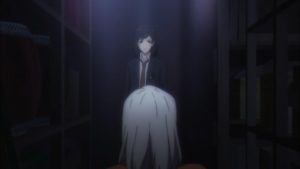
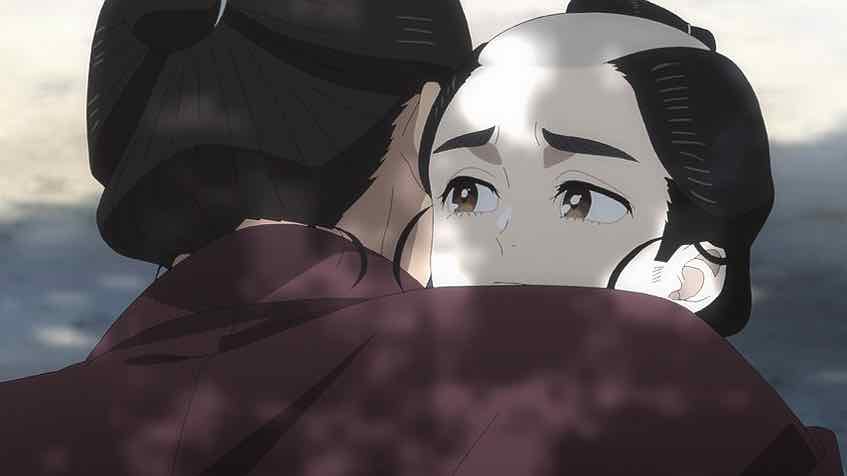
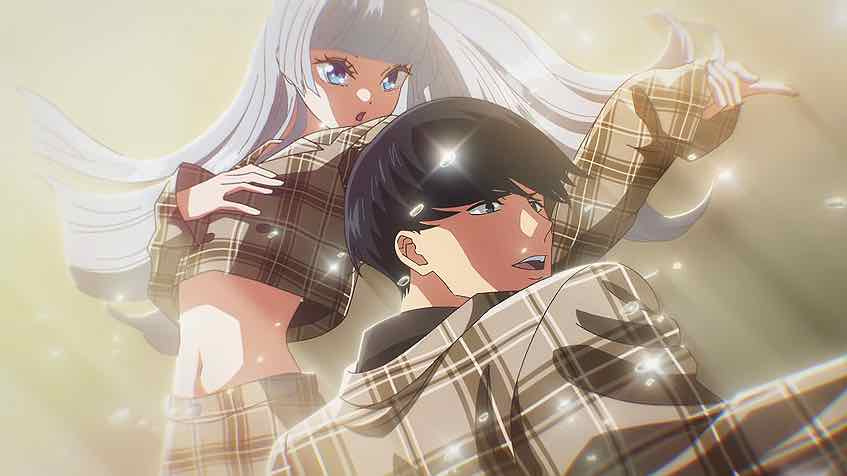
pwt
January 5, 2019 at 1:17 pmBOOBIEpop?
…oh dear, I think I’m watching the wrong show!
Guardian Enzo
January 5, 2019 at 1:30 pmI would call that a Freudian Slip but there’s not even any fanservice here to speak of.
Zaiden
January 6, 2019 at 4:36 amExposed: Enzo pretending to hate fanservice but liking it in all secrecy 😛
Guardian Enzo
January 6, 2019 at 9:17 amI never even pretend to hate it! It’s fine as long as it’s not the only thing a show has on offer. And if there’s a reason behind it. And if it’s not spirited. Or gratuitous. OK, I hate it some of the time.
Jindujun93
January 5, 2019 at 2:26 pmThis is one of those series where as a novel reader, I really need to watch out what I say and don’t say about the adaption, haha. But the cold detach part is very accurate (even more so for the old anime, if you ever take a peek at it – chronologically it should happen after the first few episodes of this anime), and I already saw my fair share of people who were complaining about yesterday’s episodes, haha.
As for me, I’m very happy with how they handled this adaption so far. A bit of modernization aside (obviously smartphones didn’t exist back then), this is a faithful adaption. Cut out things (including one named side character who had his own illustration in the novels), and did leave out a few monologues by Takeda in the first episode that explained a bit (he explained a few things about himself and Miyashita Touka), but what Shingo Natsume and his team did definitely has me resting easy so far. Going to be interesting just how much this new adaption is going to cover, especially since it seems to be sitting at an odd episode count of 18 episodes from what I’ve heard.
Guardian Enzo
January 5, 2019 at 3:12 pmI can definitely see this as being a hard sell for modern audiences, not just because of the tone but because it’s so antithetical to the modern style (thank you, LNs) of explaining everything in the first 5 minutes. Which is ironic as this is based on a LN series, technically, but like I said in the post that meant something very different when these novels came out.
Kamui
January 5, 2019 at 10:48 pmEven more irony for you: this series is “credited” as the one which “created” the light novels’ boom. Someone went as far as claiming that it success was the reason the term was coined at all.
Guardian Enzo
January 5, 2019 at 11:31 pmI’ve heard that, but I believe (not that it really matters much in this context) that “Slayers” has a more accurate claim to that distinction.
DauntingOverlord
January 5, 2019 at 3:37 pmI watched the first episode and for the first time I was yelling out loud alone “EMOTE! DO SOMETHING BESIDES JUST STANDING THERE!” Seriously, don’t even remember the guy’s name, but it was like watching a cardboard slab trying to be a human. In fact, I found a lot of the cast to be very stiff, and with the time jumps going everywhere it just lead me to be very bored with the whole affair. The second episode was better because there was no boyfriend as the main focus, but the more I learned about what was happening, the less I cared (the reorganized scenes did not help). I don’t think I’ll be returning to this one, but I’ll be sure to keep up to date on your reviews. I don’t know, but the only interesting character was Boogiepop, and Boogiepop wasn’t a focus in episode 2.
Lain
January 6, 2019 at 12:18 amIt may be too early to say this and sure I hope I’ll end up being wrong, but if this keeps up, I’d say someone with your discerning tastes would be better off watching the first Boogiepop adaptation than this one. I came into that one soon after having watched its stylistic sister Serial Experiments Lain and initially I was even more impressed with Boogiepop than I’d been with Lain (which I still consider a classic). Unfortunately its second half was story-wise a bit too pedestrian for me – for all the grand expectations that had been set up – and that turned it into somewhat of a disappointment overall, but stylistically it was pretty great throughout. The eerie style/atmosphere of the first Boogiepop is what I primarily find lacking in this new adaptation, it just doesn’t draw you in the same way.
Guardian Enzo
January 6, 2019 at 12:24 amWe’ll see, but I’m certainly going to give it a few eps before I come to that sort of decision.
Lain
January 6, 2019 at 12:52 amOh, absolutely, I wasn’t trying to warn you off this one, mostly just saying that even if you don’t end up really enjoying it, you might still want to try out the earlier version. Incidentally, that cold detachment thing both you and @Jindujun93 were talking about was curiously enough a major part of the attraction in the first version, but not so much in this one, because the style doesn’t seem to support it quite the same way, at least for me.